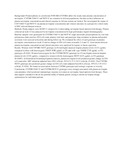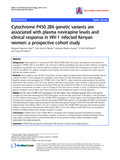| dc.contributor.author | Graham, Susan M | |
| dc.contributor.author | McClelland, R Scott | |
| dc.contributor.author | Guantai, Anastasia N | |
| dc.contributor.author | Okalebo, Faith A | |
| dc.contributor.author | Oluka, Margaret N | |
| dc.date.accessioned | 2015-07-11T12:00:15Z | |
| dc.date.available | 2015-07-11T12:00:15Z | |
| dc.date.issued | 2015 | |
| dc.identifier.citation | Oluka, M. N., Okalebo, F. A., Guantai, A. N., McClelland, R. S., & Graham, S. M. (2015). Cytochrome P450 2B6 genetic variants are associated with plasma nevirapine levels and clinical response in HIV-1 infected Kenyan women: a prospective cohort study. metabolism, 8, 9. | en_US |
| dc.identifier.uri | http://www.biomedcentral.com/content/pdf/s12981-015-0052-0.pdf | |
| dc.identifier.uri | http://hdl.handle.net/11295/87328 | |
| dc.description.abstract | Background: Polymorphisms in cytochrome P450 2B6 (CYP2B6) affect the steady state plasma concentration of
nevirapine. CYP2B6 516G>T and 983T>C are common in African populations, but data on their influence on plasma nevirapine concentration and clinical response in African women are limited. We investigated the impact of CYP 516G>T and 983T>C on plasma nevirapine concentration and clinical outcomes in a prospective cohort study of HIV-infected Kenyan women.
Methods: Study subjects were 66 HIV-1-seropositive women taking nevirapine-based antiretroviral therapy. Plasma
collected at week 12 was analyzed for nevirapine concentration by high performance liquid chromatography.
Baseline samples were genotyped for CYP2B6 516G>T and 983T>C single nucleotide polymorphisms by real-time
polymerase chain reaction. CD4 cell count, plasma viral load, and genotypic drug resistance in plasma and genital
secretions were assessed at baseline and during follow up. We evaluated the effect of each genotype on plasma
nevirapine concentration at week 12 and on change in CD4 cell count at months 3, 6 and 12. Associations between
plasma nevirapine concentration and clinical outcomes were analyzed by logistic or linear regression.
Results: Women with CYP2B6 516TT genotype (n=9) had higher mean nevirapine plasma levels (14.33 μg/mL)
compared to those with heterozygous 516GT (9.18 μg/mL; n=25) and wild- type 516GG (7.95 μg/mL; n=32) genotypes (P=0.01). Women heterozygous for the CYP2B6 983TC genotype (n=13) had higher mean nevirapine plasma levels (12.94 μg/mL), compared to women with the homozygous 983TT (8.35 μg/mL; n=53) genotype (P=0.007). In Generalized Estimating Equation analysis, plasma nevirapine levels predicted greater change in CD4 cell count after ART initiation (adjusted beta 119.4 cells/μL, 95% CI, 27.3–211.5 cells/μL, P=0.01). The CYP2B6 983TT genotype also predicted greater change in CD4 cell count (adjusted beta 68.6 cells/μL, 95% CI, 3.9–133.4 cells/μL, P=0.04). We found no associations between CYP2B6 genotypes and virologic response or toxicity.
Conclusions: CYP2B6 516G>T and CYP2B6 983T>C genotypes were strongly associated with plasma nevirapine
concentration, which predicted immunologic response in women on nevirapine-based antiretroviral therapy. These
data support continued work on the potential utility of human genetic testing to inform nevirapine dosage
optimization for individual patients | en_US |
| dc.language.iso | en | en_US |
| dc.publisher | University of Nairobi | en_US |
| dc.title | Cytochrome P450 2B6 genetic variants are associated with plasma nevirapine levels and clinical response in HIV-1 infected Kenyan women: a prospective cohort study | en_US |
| dc.type | Article | en_US |
| dc.type.material | en_US | en_US |


